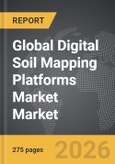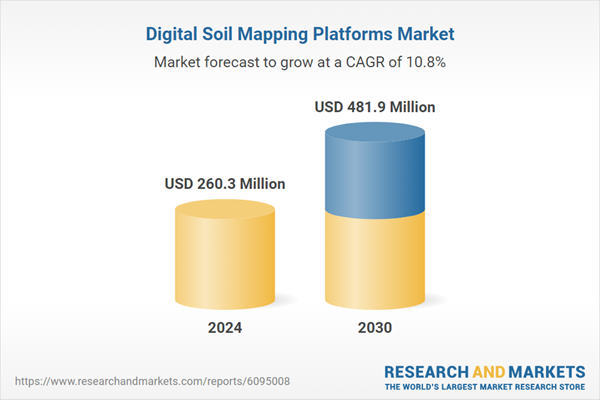Global Digital Soil Mapping Platforms Market - Key Trends & Drivers Summarized
How Are Digital Soil Mapping Platforms Revolutionizing Land Assessment and Agricultural Intelligence?
Digital Soil Mapping (DSM) platforms are transforming how soil data is collected, visualized, and utilized across agriculture, environmental monitoring, construction, and land management sectors. These platforms integrate geospatial data, machine learning algorithms, and remote sensing technologies to create high-resolution, digital representations of soil attributes such as texture, moisture, pH, organic carbon content, and nutrient availability. Unlike conventional soil surveys, DSM provides scalable, up-to-date, and spatially continuous information that is critical for precision farming, sustainable land use, and climate adaptation strategies.As global agriculture shifts toward data-driven decision-making, DSM platforms enable farmers and agronomists to evaluate site-specific soil conditions, optimize input application, and enhance crop productivity. In environmental and conservation sectors, digital soil mapping aids in erosion modeling, watershed management, and carbon sequestration monitoring. These platforms are also critical in infrastructure development, where accurate soil profiles help engineers assess land suitability and mitigate geotechnical risks.
What Technological Innovations Are Driving the Evolution of DSM Solutions?
The advancement of DSM platforms is heavily supported by the convergence of satellite imagery, drone-based sensing, geographic information systems (GIS), and AI-driven analytics. Remote sensing technologies provide spectral data on soil reflectance and vegetation indices, which serve as proxies for estimating soil properties. Proximal soil sensing using tools like electromagnetic induction, ground-penetrating radar, and portable spectrometers is also being integrated for on-site calibration and validation.Machine learning models - particularly random forests, neural networks, and kriging-based geostatistical methods - are central to predicting soil characteristics at fine spatial scales. Cloud computing allows real-time data processing, multi-layer modeling, and interactive mapping interfaces, while APIs and platform integrations enable seamless use of DSM outputs in farm management software and planning tools. These innovations are making DSM platforms more accessible, dynamic, and capable of supporting site-specific agricultural interventions at scale.
Which Sectors and Use Cases Are Accelerating the Adoption of DSM Platforms?
Agriculture remains the leading end-use sector for DSM platforms, with applications ranging from precision irrigation and fertilization planning to land suitability assessments for different crops. Large-scale farms, agri-input companies, and agricultural research institutes are deploying DSM to improve yield forecasting, reduce resource waste, and support climate-resilient farming practices. Smallholder farms are also benefiting through mobile-based DSM tools and extension services that offer localized soil recommendations.Beyond agriculture, DSM is increasingly used in civil engineering for terrain analysis and infrastructure planning, especially in large-scale transportation or urban development projects. Environmental agencies and non-profits use DSM outputs for land degradation assessments, restoration planning, and natural resource monitoring. Emerging use cases include carbon farming programs where DSM platforms assist in estimating soil organic carbon stocks and tracking sequestration potential for carbon credits.
What Factors Are Fueling Market Growth for Digital Soil Mapping Platforms?
The growth in the digital soil mapping platforms market is driven by several factors, including rising global emphasis on sustainable agriculture, increasing availability of open geospatial datasets, and growing demand for site-specific land-use recommendations. The need to increase farm productivity amid resource constraints and climate variability is pushing both public and private stakeholders to adopt more accurate soil intelligence systems. National soil health missions, carbon credit markets, and climate-smart agriculture initiatives are further propelling DSM adoption.End-use trends such as the integration of DSM in smart farming platforms, rising investments in agri-tech innovations, the proliferation of drones and satellite data providers, and the growing role of digital twins in environmental modeling are accelerating uptake. As land use planning, food security, and carbon monitoring converge as global priorities, digital soil mapping platforms are poised to become indispensable tools in both agricultural optimization and ecological sustainability.
Report Scope
The report analyzes the Digital Soil Mapping Platforms market, presented in terms of market value (US$). The analysis covers the key segments and geographic regions outlined below:- Segments: Product Type (Drone Scouting, Mobile Scouting, Satellite Imagery, Other Product Types); Application (Agriculture Cooperatives Application, Government & Research Institutes Application, Agribusiness Companies Application, Other Applications).
- Geographic Regions/Countries: World; United States; Canada; Japan; China; Europe (France; Germany; Italy; United Kingdom; Spain; Russia; and Rest of Europe); Asia-Pacific (Australia; India; South Korea; and Rest of Asia-Pacific); Latin America (Argentina; Brazil; Mexico; and Rest of Latin America); Middle East (Iran; Israel; Saudi Arabia; United Arab Emirates; and Rest of Middle East); and Africa.
Key Insights:
- Market Growth: Understand the significant growth trajectory of the Drone Scouting segment, which is expected to reach US$186.1 Million by 2030 with a CAGR of a 8.7%. The Mobile Scouting segment is also set to grow at 12.7% CAGR over the analysis period.
- Regional Analysis: Gain insights into the U.S. market, valued at $70.9 Million in 2024, and China, forecasted to grow at an impressive 14.3% CAGR to reach $97.6 Million by 2030. Discover growth trends in other key regions, including Japan, Canada, Germany, and the Asia-Pacific.
Why You Should Buy This Report:
- Detailed Market Analysis: Access a thorough analysis of the Global Digital Soil Mapping Platforms Market, covering all major geographic regions and market segments.
- Competitive Insights: Get an overview of the competitive landscape, including the market presence of major players across different geographies.
- Future Trends and Drivers: Understand the key trends and drivers shaping the future of the Global Digital Soil Mapping Platforms Market.
- Actionable Insights: Benefit from actionable insights that can help you identify new revenue opportunities and make strategic business decisions.
Key Questions Answered:
- How is the Global Digital Soil Mapping Platforms Market expected to evolve by 2030?
- What are the main drivers and restraints affecting the market?
- Which market segments will grow the most over the forecast period?
- How will market shares for different regions and segments change by 2030?
- Who are the leading players in the market, and what are their prospects?
Report Features:
- Comprehensive Market Data: Independent analysis of annual sales and market forecasts in US$ Million from 2024 to 2030.
- In-Depth Regional Analysis: Detailed insights into key markets, including the U.S., China, Japan, Canada, Europe, Asia-Pacific, Latin America, Middle East, and Africa.
- Company Profiles: Coverage of players such as Affective, Aiva Health, Biovotion, BrainCheck, Cambridge Cognition and more.
- Complimentary Updates: Receive free report updates for one year to keep you informed of the latest market developments.
Some of the 32 companies featured in this Digital Soil Mapping Platforms market report include:
- Ag Leader Technology
- AGCO Corporation
- AgriWebb
- AgroCares
- CropX
- DMT (Digital Mapping Technologies)
- Eijkelkamp Soil & Water
- GeoAgro
- Geosys
- GreenSeeker (Trimble)
- Leica Geosystems (Hexagon)
- METER Group
- MicaSense (Parrot Group)
- SoilOptix
- SoilTech
- Soilview Technologies
- SST Software
- Trimble Inc.
- Veris Technologies
- Yara International
This edition integrates the latest global trade and economic shifts into comprehensive market analysis. Key updates include:
- Tariff and Trade Impact: Insights into global tariff negotiations across 180+ countries, with analysis of supply chain turbulence, sourcing disruptions, and geographic realignment. Special focus on 2025 as a pivotal year for trade tensions, including updated perspectives on the Trump-era tariffs.
- Adjusted Forecasts and Analytics: Revised global and regional market forecasts through 2030, incorporating tariff effects, economic uncertainty, and structural changes in globalization. Includes historical analysis from 2015 to 2023.
- Strategic Market Dynamics: Evaluation of revised market prospects, regional outlooks, and key economic indicators such as population and urbanization trends.
- Innovation & Technology Trends: Latest developments in product and process innovation, emerging technologies, and key industry drivers shaping the competitive landscape.
- Competitive Intelligence: Updated global market share estimates for 2025, competitive positioning of major players (Strong/Active/Niche/Trivial), and refined focus on leading global brands and core players.
- Expert Insight & Commentary: Strategic analysis from economists, trade experts, and domain specialists to contextualize market shifts and identify emerging opportunities.
Table of Contents
Companies Mentioned (Partial List)
A selection of companies mentioned in this report includes, but is not limited to:
- Ag Leader Technology
- AGCO Corporation
- AgriWebb
- AgroCares
- CropX
- DMT (Digital Mapping Technologies)
- Eijkelkamp Soil & Water
- GeoAgro
- Geosys
- GreenSeeker (Trimble)
- Leica Geosystems (Hexagon)
- METER Group
- MicaSense (Parrot Group)
- SoilOptix
- SoilTech
- Soilview Technologies
- SST Software
- Trimble Inc.
- Veris Technologies
- Yara International
Table Information
| Report Attribute | Details |
|---|---|
| No. of Pages | 275 |
| Published | January 2026 |
| Forecast Period | 2024 - 2030 |
| Estimated Market Value ( USD | $ 260.3 Million |
| Forecasted Market Value ( USD | $ 481.9 Million |
| Compound Annual Growth Rate | 10.8% |
| Regions Covered | Global |









